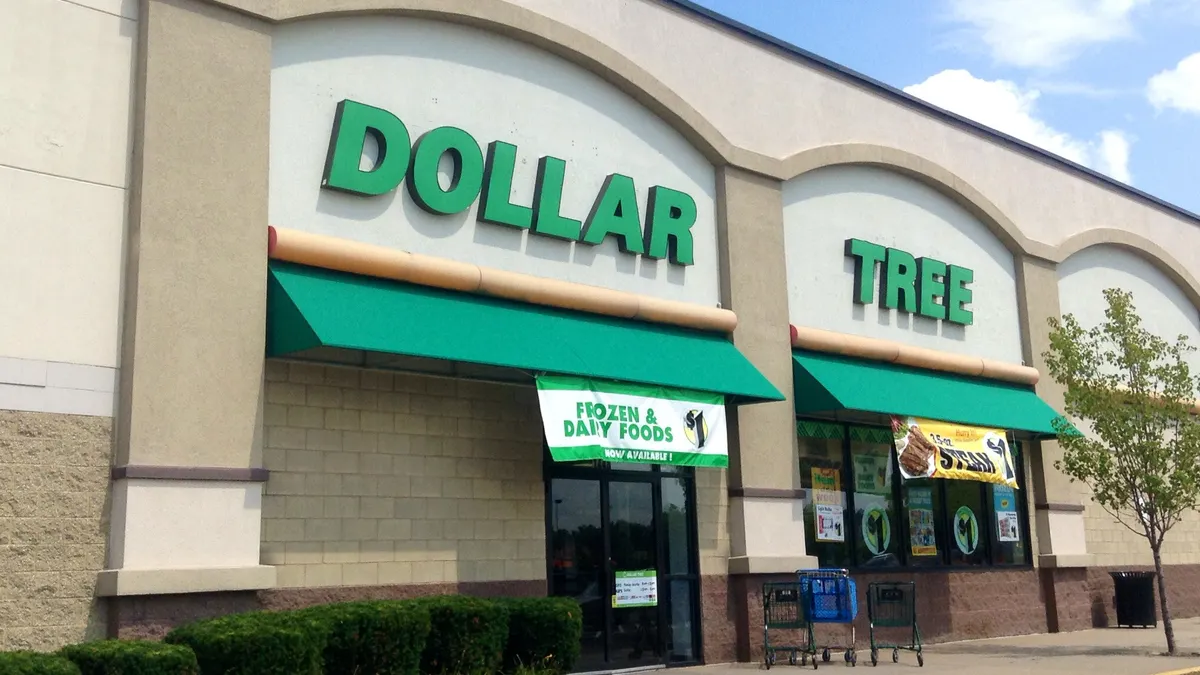Dive Brief:
- Dollar Tree reported Wednesday fourth quarter consolidated sales of $6.36 billion, a 12.9% increase over the previous year. Same-store sales grew 2.4% during the quarter, with its Dollar Tree segment growing 3.8% and Family Dollar growing 1%. The retailer continued its building spree, opening or expanding a net of 91 stores in Q4 and adding 603 stores during the fiscal year, which brought in more than $22 billion in sales.
- The deep discounter also pushed its gross margin as a percentage of sales to 33%, up from 32.1% in the year-ago period, due mainly to lower merchandise costs, markdowns and occupancy costs. Operating income increased 30.5% year over year to $765.6 million. Dollar Tree's net income was $1.04 billion, or $4.37 per share, a 221.3% increase from the previous year that was inflated by a $583.7 million tax benefit from last year's Republican tax bill.
- Adjusted earnings were $1.89 per share, compared to $1.36, a still-respectable 39% increase from the previous year but a slight miss from the FactSet consensus estimate of $1.90 a share cited by MarketWatch. Sales disappointed Wall Street even more, with total revenue falling $40 million short of the FactSet consensus, and same-store sales 0.5% short of the FactSet consensus of 2.9%. Dollar Tree's stock was down 9% in premarket trading.
Dive Insight:
Dollar stores have been on a hot streak since the recession, expanding at dizzying pace and making a mockery out of any talk of the death of physical retail. As Dollar General's CEO once put it (rather depressingly, if considered in a different light), the economy has done a very efficient job of creating dollar stores' core customers.
But while lower income shoppers might make up the base of dollar stores, the segment has also been working to bring in upscale shoppers looking for bargains and adding traffic-driving product segments, such as grocery.
In the broader retail context, Dollar Tree had a pretty respectable year. Its net sales increased 7.2% year over year, to $22.25 billion, while it increased its gross profit and tightened its selling, general and administrative expenses. For 2018, the company is projecting net sales of $22.7 billion to $23.1 billion and same-store sales in low single digits.
CEO Gary Philbin said in a statement, "We are gaining traction from the work that has been done over the past several years and, with solid execution, we are confident we can build on our momentum to grow and improve our business."
The company has some pretty robust competitors to contend with, including Walmart and Dollar General, the latter of which plans to open 900 stores this year. As Moody's Investors Service analyst Mickey Chadha pointed out earlier in March, Dollar Tree and Dollar General are running neck and neck in the dollar store segment, with Dollar Tree winning on margins and merchandise differentiation, and Dollar General enjoying better credit metrics and same-store sales growth.
Counting number of stores, Dollar Tree is the country's number one dollar retailer (14,744 as of October), compared to Dollar General (14,321 as of November). But in terms of total revenue, Dollar Tree follows its rival by a couple billion dollars, according to Chadha, who estimated that the operating profit in the dollar store sector could rise 8% in 2018.
Unlike mass merchants like Target and Walmart, dollar stores have for the most part shrugged off online sales, and the peculiarities of their consumer base will allow that to continue, Moody's analysts have said.













